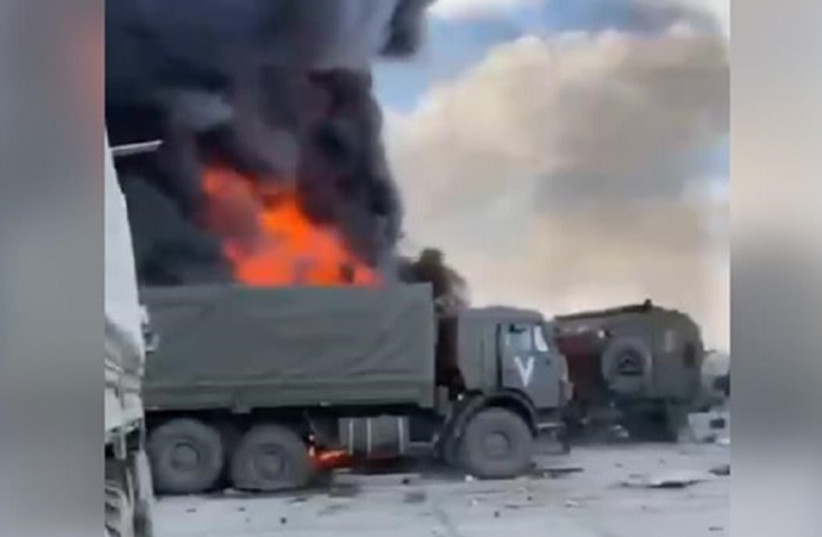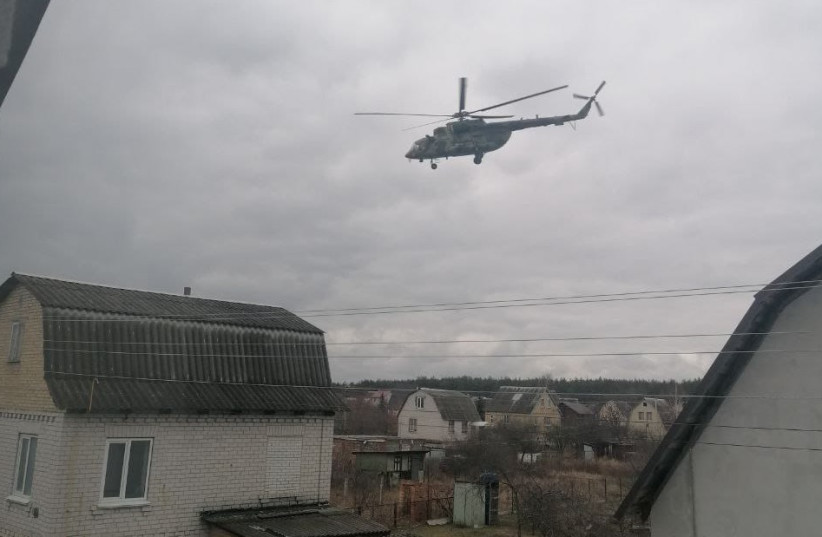KYIV - The situation in the Ukrainian capital remains extremely tense, with heavy clashes to the north continuing and Russian forces attempting to move south to encircle the city and cut off supply routes.
For more stories from The Media Line go to themedialine.org
Despite these fresh assaults, the Ukraine forces are holding out and more than three weeks since the war began, no Russian unit or soldier has managed to enter the capital.
This is not going according to President Vladimir Putin’s or the Kremlin’s plans, who hoped for a swift and easy victory.
On February 24, the day of the Russian invasion, a major target was the capture and control of the Antonov Airport or military base, to the northwest of Kyiv.
“I lived a few kilometers from the airport in the town of Hostomel,” Andrey Karkhardin, a former technical agricultural worker, explained.

Antonov military base is only 6 miles from Kyiv and was one of the major strategic targets for the Russians on day one of the offensive.
“I knew the airport was going to be attacked on the first day after the Russian forces were building up at the Belarus-Russian border,” the father of four added.
The invaders initially assaulted the airport with paratroopers, helicopters, and a cargo plane regiment to capture the airport quickly and then shift those troops to a ground assault on the capital.

“Look here,” the 42-year-old said, showing me a video of the assault. “My neighbor Natalia took these when they attacked the airport.”
“They were shifting in so many [para]troops … [and] they wanted to quickly decapitate the government, Karkhardin explained.
Natalia, a mother of four whose house was destroyed in the attack, lived about 1.2 miles from the airport. She was forced to hide in her basement and wait for an “opportune” time to escape.
“My friend Natalia has quite a story,” Karkhardin added. “She had to drive past a convoy of Russian trucks, and somehow, she managed to escape to the United States, a long journey. … I think she is the only Ukrainian who has managed to make that journey.”
Although the Russians were initially successful in capturing the airport and parts of Hostomel, they swiftly faced a counterattack by Ukrainian forces.
“There was heavy fighting in Hostomel, my hometown, in the first few days,” Karkhardin said. “I have not seen my home [recently], but when I left there was a lot of shell damage to my house, and I know Natalia’s house was completely destroyed by the fighting.”
By the end of the third day, the Russians were in full control of the airport and most of the fighting shifted to the outskirts of Hostomel, and the neighboring Bucha district.
“I fled as soon as I saw Russians in my town. I saw some of the elderly staying…, but I knew I had to leave after the shelling started to get close to my home,” Karkhardin said.
“I left with my backpack, on foot; I didn’t have my car,” he jovially stated. “I had my car in a body shop in southern Kyiv and told my friend: ‘Just get it ready, I am coming.’”
After a long journey camping through the forest, Karkhardin made it to Kyiv and headed east to relative safety.
“The strange thing about this conflict: I have relatives in Crimea, and they simply don’t believe what the Russians are doing,” he said. “It's like they are living in a different world.”
The fighting has now shifted from Karkhardin’s hometown to neighboring Irpin. There the Russian have faced perhaps the stiffest resistance around the capital, with high casualties on both sides.
Although the death toll among Russians is difficult to know, President Volodymyr Zelenskyy of Ukraine said this week that an estimated 1,300 Ukrainian soldiers had been killed since the start of the war.
Olexii Ivanchenko, an ex-military officer, was shot in the leg by the Russians when he fought in the Donbas region.
“This area to the north [of Kyiv], especially around Hostomel, was always of strategic importance to the Russians; it was always their main objective to take the capital from here,” he said.
According to Ivanchenko, who now lives in the capital and was near the airport at the start of the invasion, the initial assault was also bloody.
“You see there was heavy fighting even in the first few days around the airport and Hostomel. We [the Ukrainian forces] blew up this Russian truck but had to retreat,” he explained.
“During the day, the enemy tried to advance toward Kyiv, but they were not welcomed. We went on the offensive, and the enemy had to stop just north of the city of Irpin,” Ivanchenko said.
According to this 32-year-old, who nowadays works as a translator, “the occupiers” tried to gain a “foothold” and “stabilize their lines,” but they couldn’t because of the Ukrainian forces’ “counterattacks,” and after about “three days,” they abandoned the attempt to capture the capital.
Since the assault on Kyiv faltered, the Russian strategy has seemed to shift, with them now accepting that they are unable to enter the capital as liberators, but rather only as hostile invaders.
“Two weeks ago, there was a massive deployment of Russian parachute regiments in Hostomel, and we managed to repel it. But now we are seeing heavy clashes in the surrounding areas,” Ivanchenko said.
The heavy fighting is now taking place in Irpin, or rather around the Irpin River, which cuts through northeastern Kyiv.
“We destroyed some of Irpin’s bridges [to slow] the Russian advance. However, there was still heavy fighting in the town, now house-to-house battles,” he said.
In more recent days the Russians have tried to disperse their forces outside Irpin, in an effort to encircle the city. So far, the Ukrainians have repelled the attack.
“They still can’t take Irpin. Around 70% of Irpin is still occupied by the Russians, but 30% is still controlled by us, and we are [slowly] winning,” Ivanchenko said.
As the situation on the ground has changed, the aerial strategy has also shifted, with the Russians increasingly targeting civilian rather than military targets.
“A lot of the rocket and missile attacks that are now hitting residential buildings in Kyiv are coming from the forest areas surrounding Hostomel and the airport,” Ivanchenko calmly pointed out. “But without air support or controlling that area, there is little we can do to stop them coming.”
Despite this new strategy of targeting civilians and attempting to bludgeon Kyiv’s military defenses into defeat, the surrender of the capital is highly unlikely in the short term.
“They will never manage to take this city; our forces are too strong and the civilian [population] doesn’t want the Russians here,” Ivanchenko defiantly stated.
But the “sad outcome long-term of this war I think is that Ukrainians and Russians will never trust each other again, well at least for a generation,” he said.
